|
Today, I cut myself while shaving my legs. I must have - though I didn't notice until I was bleeding profusely. As I took to cleaning the area, the source of the trouble was revealed to me - a tiny dot of a wound.
From such a small thing came so much evidence of something being big and wrong. This puny injury, almost undeserving of a band-aid, created a startling effect. It makes me wonder if everything that looks like a big deal could be seen as small. I think we often want things to be big; there's something exciting and dramatic in BIG - for better or for worse. Perhaps we think small means are our lives are uninteresting and unimportant. Years ago, before my husband was my husband, he had a tendency to do what I called "Big Talk". He would inflate a topic with a lot of discussion and trumped up excitement until the object of his desire felt uncomfortably out of reach. His initial impulse was to dream big but by the end, he felt small in comparison to his own dream - too small to accomplish it. When we want something we can allow it to be as big as it naturally is and also use a broader view to let it be small - to not make a big deal of it. When we stop talking about things in dramatic terms, we allow them to be doable, manageable, achievable. That goes for projects, injuries, and anything else that might feel overwhelming. Let it be small and let us be as big and wonderful as we truly are. Love, Jen
0 Comments
When my grandmother died many years ago, family members arranged photos of her chronologically from the time she was a girl of 16 immigrating from Russia, until age 87 when she said goodbye. Looking over those pictures I felt like I was right there moving with her through the trajectory of her life. The sensation was like running my hand along a fence as I walked by (like when I was a child), except I was touching on the feeling of her energy as my eyes traveled each of the photographs. Though my curiosity was always peaked about the details of my grandmother's life, ultimately I was more interested in how she felt to me - who I knew her to be, the essence of who she was (still present now after all this time). Recently, my son, age 15, complained he doesn't know who he is. I told him what I've come to see - that who we are is not an intellectual concept; it cannot be identified through thinking about ourselves. We must be still and quiet and feel who we are - for who we are is far beyond any list of what we've done, any self-image, any role we play, and any job title. It's too wonderful and too expansive for any of that. We must feel it to know it, just as we must feel love to know love. Much love, Jen I was about to get in the shower the other day when I spotted a large spider by the drain. With big spiders I often relate to them more like delicate, small animals and do not feel as prone to vacuum, rinse, or smoosh them. And so, in this temperament I left and returned with a cup and a piece of paper to capture the arachnid and release him back to the wild (meaning my front lawn).
I transferred the spider to the window and dropped him to the grass below (we live in a ranch house). As I did so, the spider was so light - I realized it was much like he was his own parachute. This got me thinking. It's always a gentler landing when I am light about things. When I am judgmental, when I complain, when I try too hard, when I don't feel at ease and yet persist, I crash and burn - even when I am "right". There is a heaviness to all of that; it weighs me down. I feel I am meant to be light about things. I want my thoughts to land like feathers not send me wailing off a cliff at breakneck speed. That doesn't mean I can't think about heavier subjects. I can think about anything I like but when I have a lighter touch, when I am lighter about it all, I become my own parachute and the landing is always easier on me. How are you landing these days? Lots of love, Jen This morning, I crumpled up a tea bag cover (the herbal ones make good toys) and threw it for our cat Charlie. He ran after it, then stopped. I picked it up and did it again, and then again. In the interims, I held him and he purred. Around time #4 of the sequence he ran around wildly as though the paper ball had just come to life, picked it up in his mouth, and brought it back to me - which he repeated. The more he did this, the more I petted him, the more he raised his back to greet the affection, the more enthused he was to continue.
I always thought of faith as something I had to determine to have, specifically with no logical reason to do so. I thought it was a blind dive taken for the sake of one’s sanity when the chips were down. But lately I see faith as a natural knowing, the result of being in step with what I really want and who I really am. It’s easy for me to get out of sync with myself and feel conflicted. And focusing on what other people might think of me is the quickest way to do that. Recently when we decided to hold off taking our sick cat Olive to the vet, I got out of sorts with myself. I wanted Olive to have the chance to get better on her own but was questioning myself. When she retreated to an outside spot by our house, sat straight up with her eyes drunkenly blinking, and growled when we tried to pick her up, I was conflicted. Though I didn't feel what we were doing was wrong - I was worrying others might think so. But then I switched to thinking in a way that felt better. I let myself think 100% the way I wanted; I allowed myself to see the situation as I wished to rather than the way I thought was realistic (which so often means pessimistic). And when I did, faith was right there. Strangely, the outcome no longer seemed to matter. I knew all would be well. I was finally right with me, whether or not judged as right by anyone else. Are you right with you? Love, Jen P.S. Olive recuperated quickly. Being upset is a byproduct of standing too close to a subject and fixating on specifics that stimulate more upsetting thoughts. So lately I've stepped back from talking and thinking so hard about particulars to let the big picture emerge.
Recently, my husband and son went out and my son returned drinking a soda. Though we get soda sometimes I felt he'd had too much lately and was angry at my husband for giving in and buying it (specific). My brain raced quoting how many teaspoons of sugar in a can of soda (detail), my son's lack luster teeth brushing sprung to mind (particular), his spotty diet (detail), similar debates with my husband (specific). My mind was spinning around a thread of frustrating, control seeking thoughts. So I reduced the detailed story down to: Wanting Control and Feeling Frustrated. Then, I realized I don't feel like myself when I am trying to control anyone; I don't actually want to control anyone. I started to see the smallness of the matter against the bigness of wanting to feel like myself. The sacrifice of the big picture for my negative judgment on a detail was too great. I may have little to no control over a situation but I have control over my focus and whether or not I am in step with my true self. Soda is minor but this awareness applies to everything. Frustration is wrestling with what I cannot control, while ignoring what I can. The word integrity's derivation is "wholeness". From my integrity I do not judge details and call the whole broken. From a place of my own completeness, who I am loves all of it - the "wrong" and the "right". It loves all of it because it sees the big picture and the big picture is always gorgeous. Love, Jennifer I've read about people (who wear glasses) with multiple personalities (now termed Dissociative Identity Disorder) who have one personality with perfect vision. So when that personality is up to bat, so to speak, the person does not need glasses. Some personalities also have other kinds of differences like right or left-handedness or allergies (that the "host" personality does not). Depending upon "who" is looking through our eyes or operating our bodies, our physical apparatuses respond differently. This is all part of scientific study/observation of Dissociative Identity Disorder.
In my life, I've noticed, distinctly, that the "I" I use to look through my eyes, at any given moment, greatly affects how I see things. How I identify myself (the story I believe about me) - determines what I see, and how clearly I see each situation. Identities are self-images, also called self-concepts. If a person can have multiple ones, it opens the question: What makes one more real or authentic than the next? But there is an authenticity beneath self-concept, breathing life and intention through each possible personality. That's an identity that can serve all of our needs and desires, unfettered by the limitation of story. When we identify with that essence, the personality or self-image works in service to us (never against us), providing great clarity in our lives. Who or what is looking through your eyes? You can tell by what you're seeing. Love, Jen When someone is sick we understand their truer state is one of health and well-being; we also understand their behavior will not currently reflect who they are. They'll most likely be a bit droopy, possibly grumpy and they may be doing things like lying in bed shivering, vomiting, sweating, glassy-eyed staring at the television for hours, and sleeping the rest of the time. Normally, we would never define the person by that behavior; we wouldn't mistake the one who throws up on our shoes for the person they really are. They're feeling bad and everything they're expressing is reflective of that. Now imagine someone saying something generally like "You suck." That's a bit like being thrown up on. They're not speaking universal truth; they're feeling sick, out of tune with their true selves, and up that stuff comes. They’re still responsible for their behavior and you’re still able to decide whether you want to be around them. And the bigger picture remains truer than the smaller one. The truth of who that person is, is truer than the truth of how they're currently acting. How they're focused, the momentum of thought and feeling they've created, the state of not being in sync with themselves naturally erupts in that kind of behavior - as stomach flu erupts in vomiting. At these times, it's useful to remember that people can get out of step with their authentic selves (sometimes chronically). The question is: are we in step with ourselves? Love, Jen I came across a video of Kris Carr describing her journey living with a rare form of terminal cancer. Once diagnosed, over ten years ago, she embraced more nurturing ways of approaching her life - through meaningful work, relationship, cooking and food. Though healthier, evidence of her cancer remained unchanging - until recently. In the video, she tells of her anxiety and fatigue going to doctors to check the tumors, inspiring her to take another look at her thinking. She recognized that until her health was declared perfect, she believed she was broken. She decided to stop chasing "perfect" and start living fully for herself. Her next doctor's appointment showed remission. I've struggled and thought I was struggling with things that made it hard to like life. I thought if I could change those things, I would want to be here more and life would feel better. But it's not enough to want to be here for specific conditions, others, work, achievement or approval, we must want to give the experience of Life to ourselves. A gift is a gift only if we want it and so too is what we sometimes refer to as " the gift of life". And it is how we perceive the gift that determines whether it is experienced as such. Perceived through the lens of having to prove wholeness and rightness, it is impossible to fully embrace life. If we want to receive the gift, we have to recognize life for its underlying truth: the energy of love. For me, this is worth showing up for - essential life - always well, regardless. Love, Jen I am coming to the conclusion that not knowing is okay.
Previously I've seen not knowing as a problem. If I don't know, I can't go forward. If I don't know, I will fail. If I don't know, I am stuck or stupid (or both). But imagine this: I am told I am going to play a game called "Baseball". I have never heard of this game. The only thing I know is to step out onto the field. Those who do know give me a glove and direct me to stand by a base. I do so; now I know more. The ball is pitched, the batter hits it; he runs to first. Now I know more. The ball flies through the air. Another player runs to catch it. Now I know more. If I am fully present, it won't be long before I've recognized the structure of the game. If I stay in the game - through feedback (internal and external) and observation - I will be given the information I need for my next step. Not knowing about baseball is no problem. "Knowing" is always on its way. When my oldest son was in elementary school, he resisted homework. There was yelling and throwing. I didn't know what to do and was constantly trying to come up with solutions. My striving to know how to "fix" the situation was stressful. My desperation to know was interfering with my knowing. Eventually, I started paying a different kind of attention to what was happening - attention without judgment or resistance - and I started having small insights and gradually things got easier and better. Not knowing isn't the problem; the knowing is on its way. I must stand in the middle of it all, pay attention, and the knowing comes. Much love, Jennifer |
From the Inside
|

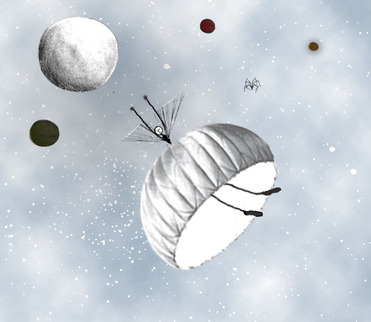
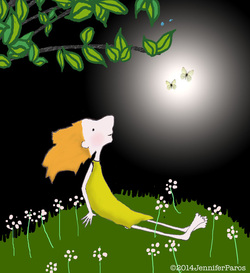

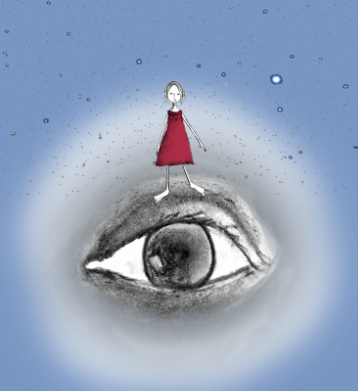
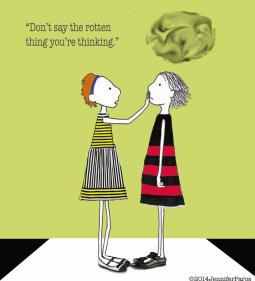
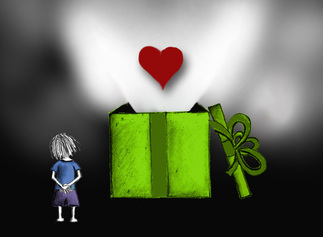
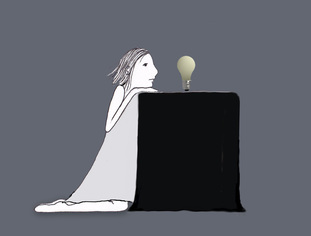
 RSS Feed
RSS Feed
